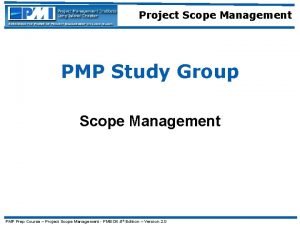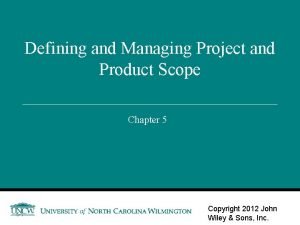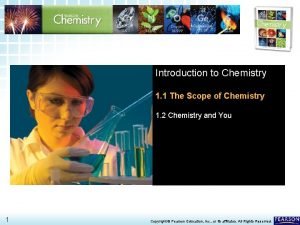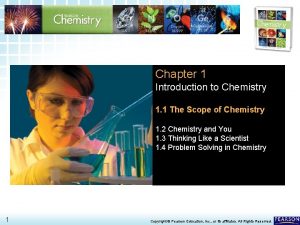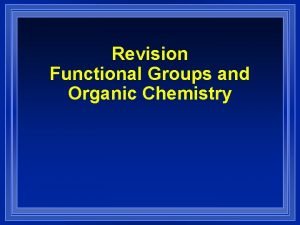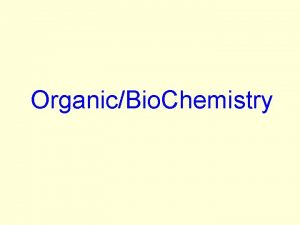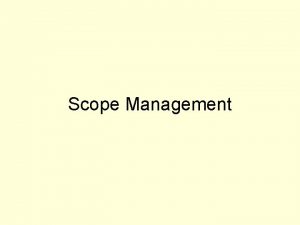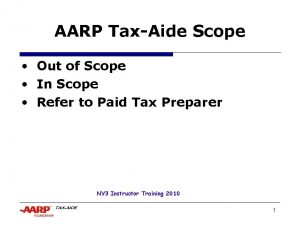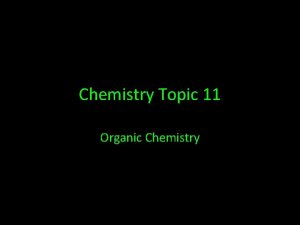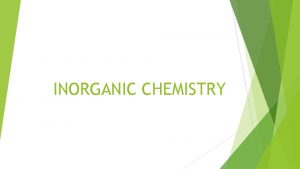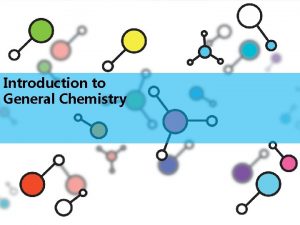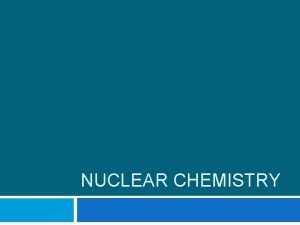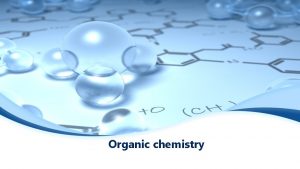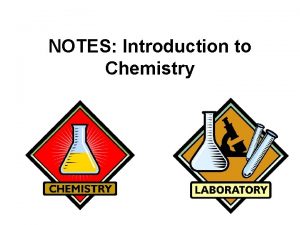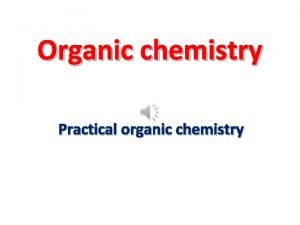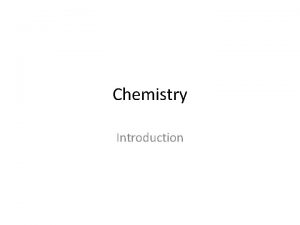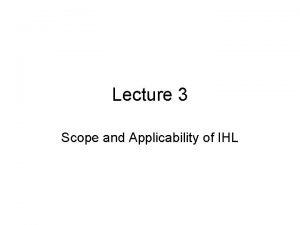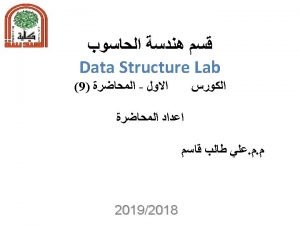1 1 The Scope of Chemistry Introduction to

























- Slides: 25

1. 1 The Scope of Chemistry > Introduction to Chemistry 1. 1 The Scope of Chemistry 1. 2 Chemistry and You 1 Copyright © Pearson Education, Inc. , or its affiliates. All Rights Reserved.

1. 1 The Scope of Chemistry > What Is Chemistry? What is matter? Matter is anything that has mass and occupies space. The trees, the water, and the buildings in the figure all examples of matter. 2 Copyright © Pearson Education, Inc. , or its affiliates. All Rights Reserved.

1. 1 The Scope of Chemistry > What Is Chemistry? Chemistry answers many questions you may have about the world you live in. • Chemistry is the study of the composition of matter and the changes that matter undergoes. 3 Copyright © Pearson Education, Inc. , or its affiliates. All Rights Reserved.

1. 1 The Scope of Chemistry > What Is Chemistry? Chemistry affects all aspects of life and most natural events because all living and nonliving things are made of matter. 4 Copyright © Pearson Education, Inc. , or its affiliates. All Rights Reserved.

1. 1 The Scope of Chemistry > Areas of Study What are five traditional areas of study in chemistry? 5 Copyright © Pearson Education, Inc. , or its affiliates. All Rights Reserved.

1. 1 The Scope of Chemistry > Areas of Study Five traditional areas of study are: 1. organic chemistry 2. inorganic chemistry 3. biochemistry 4. analytical chemistry 5. physical chemistry 6 Copyright © Pearson Education, Inc. , or its affiliates. All Rights Reserved.

1. 1 The Scope of Chemistry > Areas of Study What is organic chemistry? • Organic chemistry is defined as the study of all chemicals containing carbon. 7 Copyright © Pearson Education, Inc. , or its affiliates. All Rights Reserved.

1. 1 The Scope of Chemistry > Areas of Study What is the opposite of organic chemistry? The study of chemicals that, in general, do not contain carbon is called inorganic chemistry. • Many inorganic chemicals are found in nonliving things, such as rocks. 8 Copyright © Pearson Education, Inc. , or its affiliates. All Rights Reserved.

1. 1 The Scope of Chemistry > Areas of Study What is biochemistry? The study of processes that take place in living organisms is biochemistry. • These processes include muscle contraction and digestion. 9 Copyright © Pearson Education, Inc. , or its affiliates. All Rights Reserved.

1. 1 The Scope of Chemistry > Areas of Study What is analytical chemistry? The area of study that focuses on the composition of matter is analytical chemistry. • A task that would fall into this area of chemistry is measuring the level of carbon dioxide in the atmosphere. 10 Copyright © Pearson Education, Inc. , or its affiliates. All Rights Reserved.

1. 1 The Scope of Chemistry > Areas of Study What is physical chemistry? Physical chemistry is the area that deals with the mechanism, rate, and energy transfer that occurs when matter undergoes a change. 11 Copyright © Pearson Education, Inc. , or its affiliates. All Rights Reserved.

1. 1 The Scope of Chemistry > Areas of Study What is pure chemistry? Pure chemistry is the pursuit of chemical knowledge for its own sake. • The chemist doesn’t expect that there will be any immediate practical use for the knowledge. 12 Copyright © Pearson Education, Inc. , or its affiliates. All Rights Reserved.

1. 1 The Scope of Chemistry > Areas of Study What is applied chemistry? Applied chemistry is research that is directed toward a practical goal or application. • In practice, pure chemistry and applied chemistry are often linked. 13 Copyright © Pearson Education, Inc. , or its affiliates. All Rights Reserved.

1. 1 The Scope of Chemistry > Big Ideas in Chemistry Some of chemistry’s big ideas are as follows: • chemistry as the central science • electrons and the structure of atoms • bonding and interactions • reactions • kinetic theory • the mole and quantifying matter • matter and energy • carbon chemistry 14 Copyright © Pearson Education, Inc. , or its affiliates. All Rights Reserved.

1. 1 The Scope of Chemistry > Introduction to Chemistry 1. 1 The Scope of Chemistry 1. 2 Chemistry and You 15 Copyright © Pearson Education, Inc. , or its affiliates. All Rights Reserved.

Why>Study Chemistry? 1. 1 The Scope of Chemistry Why Study Chemistry? What are three general reasons to study chemistry? 16 Copyright © Pearson Education, Inc. , or its affiliates. All Rights Reserved.

Why>Study Chemistry? 1. 1 The Scope of Chemistry can be useful in explaining the natural world, preparing people for career opportunities, and producing informed citizens. 17 Copyright © Pearson Education, Inc. , or its affiliates. All Rights Reserved.

Why>Study Chemistry? 1. 1 The Scope of Chemistry 1. Explaining the Natural World Chemistry can help you satisfy your natural desire to understand how things work. For example, chemistry can explain: • why cut apples turn brown upon exposure to air. • why the texture of eggs changes from runny to firm as eggs are boiled. • why water expands as it freezes. • why sugar dissolves faster in hot water than in cold water. • why yeast makes bread dough rise. 18 Copyright © Pearson Education, Inc. , or its affiliates. All Rights Reserved.

Why>Study Chemistry? 1. 1 The Scope of Chemistry 2. Preparing for a Career Chemists contribute to society in many ways. You do not need to have the word chemist in your job title to benefit from understanding chemistry. 19 Copyright © Pearson Education, Inc. , or its affiliates. All Rights Reserved.

Why>Study Chemistry? 1. 1 The Scope of Chemistry 3. Being an Informed Citizen Industry, private foundations, and the federal and state government all provide funds for scientific research. • Space exploration research could not take place without federal funding. • NASA research has led to the development of many items used on Earth. These include smoke detectors, scratch-resistant plastic lenses, heart monitors, and flat-screen televisions. • What if all the money spent on space exploration was used to find a cure for cancer? 20 Copyright © Pearson Education, Inc. , or its affiliates. All Rights Reserved.

Why>Study Chemistry? 1. 1 The Scope of Chemistry Being an Informed Citizen You will need to make choices that will influence the direction of scientific research. • You may vote directly on some issues through ballot initiatives or indirectly through the officials you elect. 21 Copyright © Pearson Education, Inc. , or its affiliates. All Rights Reserved.

Why>Study Chemistry? 1. 1 The Scope of Chemistry Being an Informed Citizen When it comes to scientific research, there is no one correct answer. • However, knowledge of chemistry and other sciences can help you evaluate the data presented, arrive at an informed opinion, and take appropriate action. 22 Copyright © Pearson Education, Inc. , or its affiliates. All Rights Reserved.

Chemistry, Technology, and Society 1. 1 The Scope of Chemistry > Chemistry, Technology, and Society What are some outcomes of modern research in chemistry? 23 Copyright © Pearson Education, Inc. , or its affiliates. All Rights Reserved.

Chemistry, Technology, and Society 1. 1 The Scope of Chemistry > What is technology? Many basic items you use every day, such as the sneakers you wear or the cereal you eat, are products of technology. • Technology is the means by which a society provides its members with those things needed and desired. 24 Copyright © Pearson Education, Inc. , or its affiliates. All Rights Reserved.

Chemistry, Technology, and Society 1. 1 The Scope of Chemistry > Modern research in chemistry can lead to technologies that aim to benefit the environment, conserve and produce energy, improve human life, and expand our knowledge of the universe. 25 Copyright © Pearson Education, Inc. , or its affiliates. All Rights Reserved.
 Scope management pmp
Scope management pmp Product scope vs project scope
Product scope vs project scope The scope of chemistry
The scope of chemistry Scope of physical chemistry
Scope of physical chemistry Ib organic chemistry
Ib organic chemistry Inorganic chemistry vs organic chemistry
Inorganic chemistry vs organic chemistry Hát kết hợp bộ gõ cơ thể
Hát kết hợp bộ gõ cơ thể Bổ thể
Bổ thể Tỉ lệ cơ thể trẻ em
Tỉ lệ cơ thể trẻ em Gấu đi như thế nào
Gấu đi như thế nào Tư thế worm breton
Tư thế worm breton Chúa yêu trần thế alleluia
Chúa yêu trần thế alleluia Các môn thể thao bắt đầu bằng tiếng chạy
Các môn thể thao bắt đầu bằng tiếng chạy Thế nào là hệ số cao nhất
Thế nào là hệ số cao nhất Các châu lục và đại dương trên thế giới
Các châu lục và đại dương trên thế giới Công thức tính thế năng
Công thức tính thế năng Trời xanh đây là của chúng ta thể thơ
Trời xanh đây là của chúng ta thể thơ Mật thư tọa độ 5x5
Mật thư tọa độ 5x5 101012 bằng
101012 bằng độ dài liên kết
độ dài liên kết Các châu lục và đại dương trên thế giới
Các châu lục và đại dương trên thế giới Thơ thất ngôn tứ tuyệt đường luật
Thơ thất ngôn tứ tuyệt đường luật Quá trình desamine hóa có thể tạo ra
Quá trình desamine hóa có thể tạo ra Một số thể thơ truyền thống
Một số thể thơ truyền thống Cái miệng bé xinh thế chỉ nói điều hay thôi
Cái miệng bé xinh thế chỉ nói điều hay thôi
